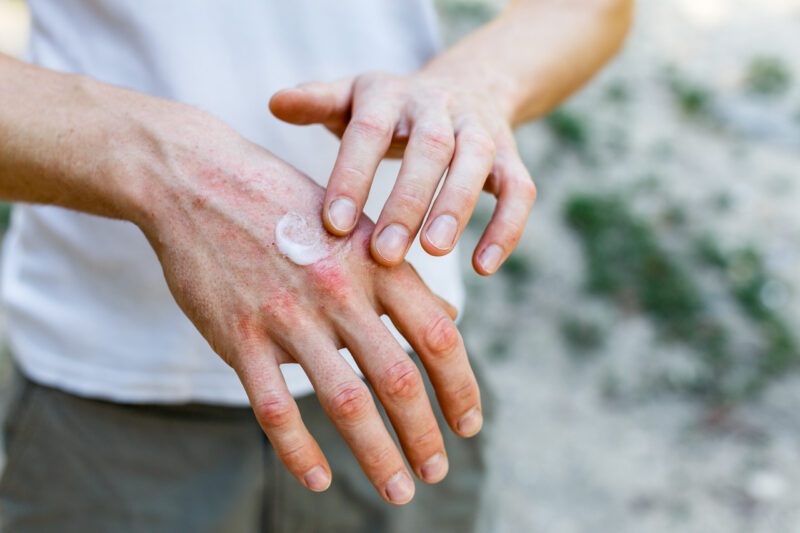ATOPIC DERMATITIS
Helping Manage Symptoms And Reduce Flares
Atopic dermatitis, also known as eczema, is a chronic inflammatory condition of the skin which causes the skin to become inflamed, red and itch. Eczema can be quite common in children and some adults and tends to have periods of flaring, usually due to a trigger. While eczema can be seasonal (worse in winter or spring), it is often associated with people who have allergies and/or asthma. During a flare, the skin may appear dry and scaly with raised patches of redness. It is common on the knuckles of fingers and the bend of the elbows and backs of knees. Eczema may present in babies on the cheeks, face and scalp.
One of the most important actions to take when treating eczema in children or adults is to keep the affected skin clean, as it can be prone to infection. Since atopic dermatitis is generally a chronic skin condition, managing the symptoms will help reduce the flares and keep the associated itching and discomfort to a minimum. Adopting a daily skincare regimen of moisturizing and avoiding harsh chemicals and soaps will help combat the itching and discomfort of eczema as well.
Causes of Atopic Dermatitis/Eczema
A common trait amongst patients who suffer from atopic dermatitis is allergies. Food allergies, as well as seasonal allergies, can make eczema worse. Although doctors do not know the exact cause of eczema, it often runs in families, which indicates a genetic component. Additional causes of eczema may include:
- Environment – children or adults who live in very cold climates with low humidity tend to be more prone to eczema
- Overactive Immune System – an immune system that overreacts may cause or worsen flares with a cold or the flu
- Allergens – pet dander, harsh laundry soaps, mold and pollen, are thought to cause eczema
Eczema Triggers
Some potential triggers that can exacerbate atopic dermatitis include:
- Chlorine
- Scented laundry detergents and dryer sheets
- Wool clothing
- Bubble bath soaps, certain shampoos or bath bombs
- Cigarette smoke
- Temperature changes
- Prolonged exposure to water
A key part of managing eczema is identifying the triggers and trying to avoid them.
The Itch-Scratch Cycle
When the skin becomes dry and irritated, it causes itching to occur. Scratching the skin to relieve the itch releases histamines, which are chemicals in the body that cause inflammation and more itching. This itching and scratching cycle can quickly cause the skin barrier to break down with open sores and cracks, which leads to potential skin infections. People who suffer from eczema can get bacterial skin infections more readily than those who don’t have eczema. The itch-scratch cycle tends to worsen at night, which can impact one’s sleep. The best way to combat the itch-scratch cycle is to maintain a daily moisturizing routine and to avoid triggers whenever possible.
Symptoms of Atopic Dermatitis/Eczema
Perhaps the most significant symptom of eczema is the intense itching that patients experience during a flare. Itching can be so severe that it causes people to scratch the skin until it bleeds which opens the skin up to harmful bacteria that are naturally present on the skin.
Additional symptoms of atopic dermatitis/eczema include:
- Sensitive skin
- Dry skin
- Inflamed, red skin
- Discolored or red patches of skin on: hands, feet, wrists, ankles, crease of elbows, behind the knees, knuckles, nail beds, eyelids, scalp and upper chest
- Rough, scaly patches of skin
- Patches of skin oozing and crusting
- Mild swelling in affected areas
Some people may have mild symptoms of eczema, while others experience more widespread and severe symptoms. If you have noticed that you have dry, itchy, scaly patches of skin anywhere on your body, a dermatologist can help you determine if you have atopic dermatitis. At Complexions Dermatology, located in Danville and Colonial Heights, VA, we specialize in diagnosing and treating skin conditions such as atopic dermatitis. Schedule your appointment online today or call at our Danville location (434) 792-0423 or our Colonial Heights location (804) 805-8442.
Diagnosing and Treating Atopic Dermatitis/Eczema
If you have been suffering from the symptoms of eczema, especially the intense itching that is associated with this skin condition, Complexions Dermatology can help. Our dermatologists are experts in diagnosing and treating atopic dermatitis. While there is no cure for eczema, there are ways to manage the symptoms and reduce the number of flares by avoiding triggers. We will work together to determine what irritants may be exacerbating your eczema and suggest a daily moisturizing regimen and/or skincare routine that can help provide relief.
It is important to treat eczema for your comfort, but it can also lead to bacterial infections, which may require additional medications to treat. Our goals when treating atopic dermatitis will be to help:
- Prevent eczema from getting worse
- To relieve itching and calm the skin using daily moisturizers and creams
- Reduce the inflammation caused by eczema by prescribing topical creams
- Eliminate or decrease the itch-scratch cycle to help prevent skin infections
With a combination of topical anti-inflammatory creams, daily skincare and lifestyle modification, you will be able to manage your eczema successfully. Complexions Dermatology will work with you to identify your triggers and create a daily skincare routine to follow that will strengthen your skin barrier and restore the health and function of your skin. Call our Danville location (434) 792-0423 or our Colonial Heights location (804) 805-8442 to learn more.





